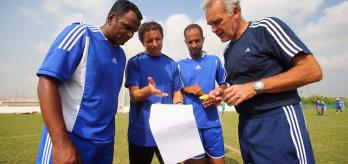In this Science Explained presentation, Dr Kathryn Johnston of the University of Toronto applies the principles of applied linguistics to two of the most widely-used terms in football: “potential” and “performance.” A coach’s job often depends on being able to assess players on the basis of these two concepts, but they mean very different things to different people, which makes them difficult to understand and measure. With that in mind, could adopting clearer definitions of these and other terms make talent development systems more effective? The session is followed by a Q&A, hosted by FIFA’s Dr Paul Bradley.
Highlight the importance of accurate terminology in football, and particularly in talent development. Draw attention to the difficulty of measuring concepts that have not been defined properly. Suggest how coaches and practitioners might come up with more precise definitions that would facilitate the development of young players.
Blurred or fuzzy terminology can make it very difficult to measure certain attributes considered important for talent development, including “potential” and “performance.” This in turn makes it more difficult for coaches and practitioners to monitor the progress of young players and predict how far they might go in the game.
Practitioners could look to re-define key concepts within their talent development systems to make them more precise and measureable. In some cases, this will mean questioning existing practices, which can be uncomfortable, but it could be an important step towards making talent development systems more effective.
Watch video
Read summary
Part 1: Applied linguistics and why it matters
Applied linguistics, or the study of how language is used in practice, was studied by the Ancient Greeks, but it only became a major academic discipline in the 19th century, when the links between the words we use and the way we think became clearer. Many individual words lack an agreed definition, and the sporting lexicon is full of these “blurry” terms. Take “talent” or “the X factor”, for instance: if you ask ten coaches what these terms mean, you are quite likely to get ten different answers. So what is it that we are really looking for?
Part 2: An example of “blurry” terms in sport: potential v performance
That question gets to the heart of what Dr Johnston calls “the precision conundrum.” Coaches and journalists make liberal use of terms like “performance” and “potential”, but often struggle to articulate exactly what they mean. This imprecision flies in the face of attempts to apply principles like marginal gains in training, because they rely on a scientific approach, including the ability to identify and measure specific attributes and characteristics. If you can’t define what you’re looking for, you are unlikely to be able to measure it, and if you can’t measure it, you probably can’t coach it.
Part 3: Implications for practitioners
Coaches are expected to play a lot of different and complex roles, including that of fortune-teller; it’s their job to work out which players are most likely to progress to the senior game. Defining the key attributes behind that success more precisely might reduce the burden on coaches by making those attributes easier to measure and monitor over time. Of course, coming up with better definitions might also mean questioning assumptions. That can be a challenging process, but it might be the first step towards making talent identification systems more effective.
Q&A
00:29
Have you got any basic tips for making the distinction between terms easier for people working in the game?
02:02
Football is played in almost every country in the world. How do you think different cultures and linguistic backgrounds influence how we talk about these two terms?
04:09
What would your approach be if faced with a number of people within an organisation who have different approaches to potential and performance?
07:44
How might these terms affect a player’s (or coach’s) mindset around training and development?
09:50
We know potential is important, but some practitioners in the game are still being judged on short-term performance. How can we change that mindset to foster potential over performance?
12:52
We can measure performance accurately and fairly easily. Do you think science needs to do a better job at defining potential? If so, how can it do better?
14:39
You mentioned the continuum of performance v potential. Could you provide some practical tips for people looking to start that continuum within their own organisations?
17:48
When it comes to talent ID and selection, how do you define accuracy, and how does that lead into potential and performance?
20:50
Are there any other terms that deserve real scrutiny in a football context?
22:44
What are the key take-home messages you would like to pass on from your presentation?











